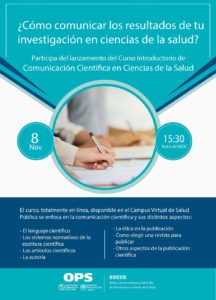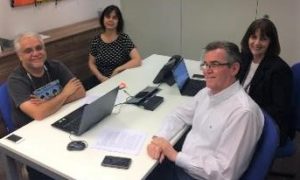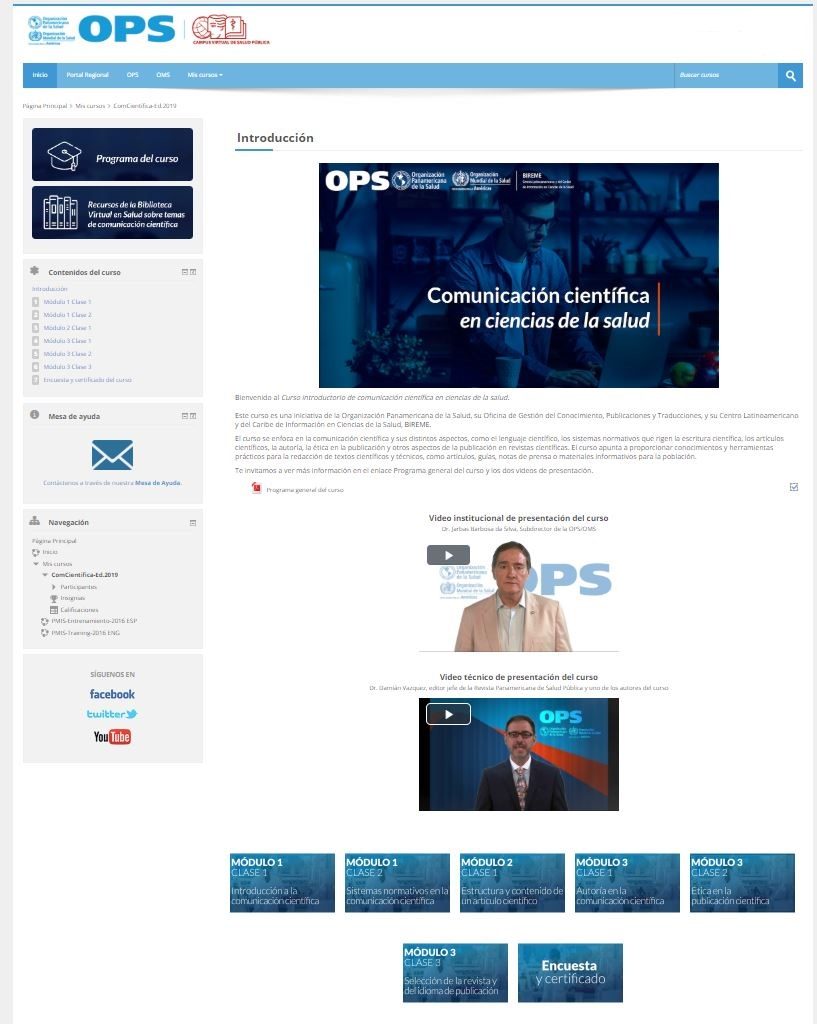The Pan American Health Organization/World Health Organization, through the Latin American and Caribbean Center on Health Sciences Information (BIREME) and the Knowledge Management, Publications and Translations Office (KMP), has just launched an Introductory Course in Scholarly Communication for Health Sciences in a self-learning format. Its main objective is to improve and promote the publication of research findings and the appropriate writing of scientific and technical reports and scientific articles.
 The launch occurred virtually on the 8th of November, with the participation of a large number of professionals in the region, and contained an audio message from the Assistant Director of PAHO/WHO, Dr. Jarbas Barbosa da Silva, who in his speech highlighted that “PAHO is conscious of the need for improving the creation, transference, and use of health evidences and knowledge, so that the data published can support health policies. We must improve the production of health knowledge in the whole region, and this knowledge must be disseminated to benefit the greatest possible number of communities.” The opening of the course was led by Dr. Diego Gonzalez, Director of BIREME, and was attended by Mrs. Eliane dos Santos, Regional Advisor for Knowledge Management and PAHO/WHO Networks, and the authors of the course, Dr. Damián Vazquez, Chief Editor of the Pan American Journal of Public Health, and Dr. Lilian Calò, Coordinator of Scholarly Communication at BIREME. A presentation with the step-by-step process of registering and completing the course through the Virtual Campus for Public Health was given by the director thereof, Mr. Gabriel Livstovski. At the date of publication of this news, there have been 1,829 people registered and 398 people approved in the course.
The launch occurred virtually on the 8th of November, with the participation of a large number of professionals in the region, and contained an audio message from the Assistant Director of PAHO/WHO, Dr. Jarbas Barbosa da Silva, who in his speech highlighted that “PAHO is conscious of the need for improving the creation, transference, and use of health evidences and knowledge, so that the data published can support health policies. We must improve the production of health knowledge in the whole region, and this knowledge must be disseminated to benefit the greatest possible number of communities.” The opening of the course was led by Dr. Diego Gonzalez, Director of BIREME, and was attended by Mrs. Eliane dos Santos, Regional Advisor for Knowledge Management and PAHO/WHO Networks, and the authors of the course, Dr. Damián Vazquez, Chief Editor of the Pan American Journal of Public Health, and Dr. Lilian Calò, Coordinator of Scholarly Communication at BIREME. A presentation with the step-by-step process of registering and completing the course through the Virtual Campus for Public Health was given by the director thereof, Mr. Gabriel Livstovski. At the date of publication of this news, there have been 1,829 people registered and 398 people approved in the course.
The publication of research results is an integral part of the evolution of science. Researchers communicate their findings with the scientific community and with society, and the publication of scientific evidence contributes to our global knowledge, the well-being of a population, and the growth of nations. Scientific writing – the specific language of scientific and technical reports – has unique characteristics that aim to preserve the accuracy and truth of the observations, and to communicate the results with precision. An effective scholarly communication also enables studies to be reproduced by other scientists, a mechanism of self-control of science.
The course is intended for professionals and technicians in health sectors, researchers, scientific editors, graduate students in health careers, and other interested parties.
It is important to emphasize that this is an introductory course aimed at:
- Introduce the fundamental concepts of scholarly communication in health sciences; Increase the awareness about and necessity of reporting research and clinical observation results; and Understand the principles and norms that govern the appropriate writing of scientific reports and articles.
The course is structured in 3 modules, whose contents, exercises, and reading suggestions are interrelated. It is based on self-learning, rather than tutoring. Through this form, each participant has the autonomy to complete the course according to his/her availability and can access it at any moment through a computer or tablet. The course demands approximately 20 hours for effective development, and a minimum of one hour of daily dedication to facilitate learning. Each lesson includes specific exercises with multiple choice questions, or other types, each with corresponding answers and comments, bibliographic references, links to useful resources, and evaluations in each module.
At the completion of the course, the expectation is that the participant can draft a scientific report or a scientific article in his/her research area, as well as present it to a scientific journal, interpret comments by the editors and reviewers and, finally, succeed in having the article accepted for publication.
 According to the VCPH quality survey, the course was relevant and adequate for the majority of participants. Professionals from 25 countries, including non-Spanish speakers, participated in the course, coming primarily from Mexico, Colombia, Equador, Argentina, and Peru. According to their professional categories, the participants are primarily nursing professionals, doctors, and medical specialists. Voluntary remarks left by participants were very positive, and there were comments that should be taken into consideration for planning a translation or new course modules.
According to the VCPH quality survey, the course was relevant and adequate for the majority of participants. Professionals from 25 countries, including non-Spanish speakers, participated in the course, coming primarily from Mexico, Colombia, Equador, Argentina, and Peru. According to their professional categories, the participants are primarily nursing professionals, doctors, and medical specialists. Voluntary remarks left by participants were very positive, and there were comments that should be taken into consideration for planning a translation or new course modules.
